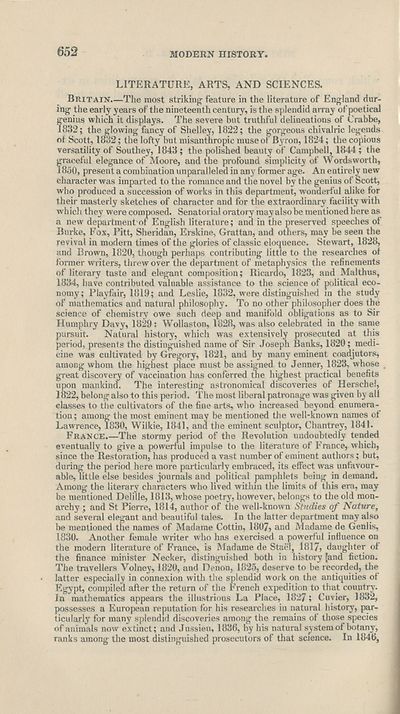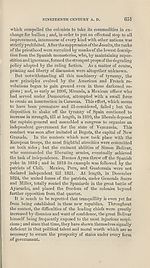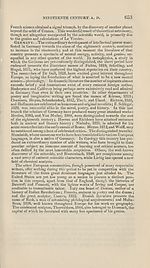Download files
Complete book:
Individual page:
Thumbnail gallery: Grid view | List view

652
MODERN HISTORY.
LITERATURE, ARTS, AND SCIENCES.
Britain—The most striking feature in the literature of England dur¬
ing the early years of the nineteenth century, is the splendid array of poetical
genius which it displays. The severe but truthful delineations of Crabbe,
1832; the glowing fancy of Shelley, 1822; the gorgeous chivalric legends
of Scott, 1832; the lofty but misanthropic muse of Byron, 1824; the copious
versatility of Southey, 1843; the polished beauty of Campbell, 1844; the
graceful elegance of Moore, and the profound simplicity of Wordsworth,
1850, present a combination unparalleled in any former age. An entirely new
character was imparted to the romance and the novel by the genius of Scott,
who produced a succession of works in this department, wonderful alike for
their masterly sketches of character and for the extraordinary facility with
which they were composed. Senatorial oratory may also be mentioned here as
a new department of English literature; and in the preserved speeches of
Burke, Fox, Pitt, Sheridan, Erskine, Grattan, and others, may be seen the
revival in modern times of the glories of classic eloquence. Stewart, 1828,
and Brown, 1820, though perhaps contributing little to the researches of
former writers, threw over the department of metaphysics the refinements
of literary taste and elegant composition; Ricardo, 1823, and Malthus,
1834, have contributed valuable assistance to the science of political eco¬
nomy; Playfair, 1819; and Leslie, 1832, were distinguished in the study
of mathematics and natural philosophy. To no other philosopher does the
science of chemistry owe such deep and manifold obligations as to Sir
Humphry Davy, 1829: Wollaston, 1828, was also celebrated in the sanie
pursuit. Natural history, which was extensively prosecuted at this
period, presents the distinguished name of Sir Joseph Banks, 1820; medi¬
cine was cultivated by Gregory, 1821, and by many eminent coadjutors,
among whom the highest place must be assigned to Jenner, 1823, whose
great discovery of vaccination has conferred the highest practical benefits
upon mankind. The interesting astronomical discoveries of Herschel,
1822, belong also to this period. The most liberal patronage was given by all
classes to the cultivators of the fine arts, who increased beyond enumera¬
tion; among the most eminent may be mentioned the well-known names of
Lawrence, 1830, Wilkie, 1841, and the eminent sculptor, Chantrey, 1841.
France The stormy period of the Revolution undoubtedly tended
eventually to give a powerful impulse to the literature of France, which,
since the Restoration, has produced a vast number of eminent authors; but,
during the period here more particularly embraced, its effect was unfavour¬
able, Tittle else besides journals and political pamphlets being in demand.
Among the literary characters who lived within the limits of this era, may
be mentioned Delille, 1813, whose poetry, however, belongs to the old mon¬
archy ; and St Pierre, 1814, author of the well-known Studies of Nature,
and several elegant and beautiful tales. In the latter department may also
lie mentioned the names of Madame Cottin, 1807, and Madame de Genlis,
1830. Another female writer who has exercised a powerful influence on
the modern literature of France, is Madame de Stacl, 1817, daughter of
the finance minister Necker, distinguished both in history [and fiction.
The travellers Volney, 1820, and Denon, 1825, deserve to be recorded, the
latter especially in connexion with the splendid work on the antiquities of
Egypt, compiled after the return of the French expedition to that country.
In mathematics appears the illustrious La Place, 1827; Cuvier, 1832,
possesses a European reputation for his researches in natural history, par¬
ticularly for many splendid discoveries among the remains of those species
of animals now extinct; and Jussieu, 1836, by his natural system of botany,
ranks among the most distinguished prosecutors of that science. In 1846,
MODERN HISTORY.
LITERATURE, ARTS, AND SCIENCES.
Britain—The most striking feature in the literature of England dur¬
ing the early years of the nineteenth century, is the splendid array of poetical
genius which it displays. The severe but truthful delineations of Crabbe,
1832; the glowing fancy of Shelley, 1822; the gorgeous chivalric legends
of Scott, 1832; the lofty but misanthropic muse of Byron, 1824; the copious
versatility of Southey, 1843; the polished beauty of Campbell, 1844; the
graceful elegance of Moore, and the profound simplicity of Wordsworth,
1850, present a combination unparalleled in any former age. An entirely new
character was imparted to the romance and the novel by the genius of Scott,
who produced a succession of works in this department, wonderful alike for
their masterly sketches of character and for the extraordinary facility with
which they were composed. Senatorial oratory may also be mentioned here as
a new department of English literature; and in the preserved speeches of
Burke, Fox, Pitt, Sheridan, Erskine, Grattan, and others, may be seen the
revival in modern times of the glories of classic eloquence. Stewart, 1828,
and Brown, 1820, though perhaps contributing little to the researches of
former writers, threw over the department of metaphysics the refinements
of literary taste and elegant composition; Ricardo, 1823, and Malthus,
1834, have contributed valuable assistance to the science of political eco¬
nomy; Playfair, 1819; and Leslie, 1832, were distinguished in the study
of mathematics and natural philosophy. To no other philosopher does the
science of chemistry owe such deep and manifold obligations as to Sir
Humphry Davy, 1829: Wollaston, 1828, was also celebrated in the sanie
pursuit. Natural history, which was extensively prosecuted at this
period, presents the distinguished name of Sir Joseph Banks, 1820; medi¬
cine was cultivated by Gregory, 1821, and by many eminent coadjutors,
among whom the highest place must be assigned to Jenner, 1823, whose
great discovery of vaccination has conferred the highest practical benefits
upon mankind. The interesting astronomical discoveries of Herschel,
1822, belong also to this period. The most liberal patronage was given by all
classes to the cultivators of the fine arts, who increased beyond enumera¬
tion; among the most eminent may be mentioned the well-known names of
Lawrence, 1830, Wilkie, 1841, and the eminent sculptor, Chantrey, 1841.
France The stormy period of the Revolution undoubtedly tended
eventually to give a powerful impulse to the literature of France, which,
since the Restoration, has produced a vast number of eminent authors; but,
during the period here more particularly embraced, its effect was unfavour¬
able, Tittle else besides journals and political pamphlets being in demand.
Among the literary characters who lived within the limits of this era, may
be mentioned Delille, 1813, whose poetry, however, belongs to the old mon¬
archy ; and St Pierre, 1814, author of the well-known Studies of Nature,
and several elegant and beautiful tales. In the latter department may also
lie mentioned the names of Madame Cottin, 1807, and Madame de Genlis,
1830. Another female writer who has exercised a powerful influence on
the modern literature of France, is Madame de Stacl, 1817, daughter of
the finance minister Necker, distinguished both in history [and fiction.
The travellers Volney, 1820, and Denon, 1825, deserve to be recorded, the
latter especially in connexion with the splendid work on the antiquities of
Egypt, compiled after the return of the French expedition to that country.
In mathematics appears the illustrious La Place, 1827; Cuvier, 1832,
possesses a European reputation for his researches in natural history, par¬
ticularly for many splendid discoveries among the remains of those species
of animals now extinct; and Jussieu, 1836, by his natural system of botany,
ranks among the most distinguished prosecutors of that science. In 1846,
Set display mode to:
![]() Universal Viewer |
Universal Viewer | ![]() Mirador |
Large image | Transcription
Mirador |
Large image | Transcription
| Antiquarian books of Scotland > Education > Elements of universal history on a new and systematic plan > (672) |
|---|
| Permanent URL | https://digital.nls.uk/127588204 |
|---|
| Description | Thousands of printed books from the Antiquarian Books of Scotland collection which dates from 1641 to the 1980s. The collection consists of 14,800 books which were published in Scotland or have a Scottish connection, e.g. through the author, printer or owner. Subjects covered include sport, education, diseases, adventure, occupations, Jacobites, politics and religion. Among the 29 languages represented are English, Gaelic, Italian, French, Russian and Swedish. |
|---|

